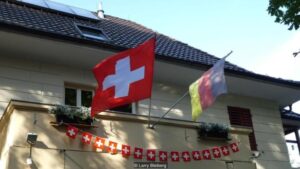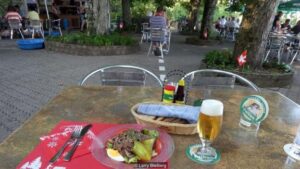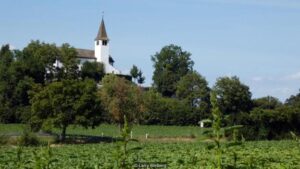
 travel
travel 
The tiny enclave of Büsingen am Hochrhein, surrounded by Switzerland but owned by Germany, has managed a binational existence for centuries.
Summer vacationers are out in full on 1 August, Switzerland’s National Day. A flotilla of rafts and canoes float along the Rhine River, sunbathers lie on the grassy beach, and an occasional public bus rumbles along the mostly empty streets, adorned with the famous red flag of Switzerland with a white cross for the festivities.
Except for one nagging item, it’s a perfect holiday scene. All this merrymaking is taking place in Germany to mark the anniversary of Switzerland’s confederation.
“It’s enticing to make holidays here,” explained Roland Güntert, Deputy Mayor of the German city of Büsingen am Hochrhein. “It’s just something you’re doing. Our hearts and mind are Swiss.”
The reason? This tiny spot of Germany is surrounded by Switzerland, making it both an enclave and an exclave for trivia fans, but confusing to everyone else.
An enclave is a region or part of a state surrounded by another country for the cartographically curious–a prime example is the tiny Lesotho nation surrounded by South Africa. It is closely connected with an exclave: a portion of a territory divided by another region from its central part. Büsingen follows these two meanings.
The eastern border of the village lies just 700 m from the rest of Germany. And while this city of approximately 1,450 inhabitants belongs to Germany politically, it is economically part of Switzerland.
Büsingen operates outside the European Union, just like Switzerland, and the city has been cited as a model for post-Brexit cooperation. A lawmaker from Belfast South proposed three years ago that a special customs status could be given to Northern Ireland, close to the one that governs Büsingen.
As with Büsingen and Switzerland, Northern Ireland and the Republic of Ireland would have restricted customs or immigration controls, MP Alasdair McDonnell indicated, suggesting that Northern Ireland might leave the EU with Brexit but stay attached to the Republic of Ireland. “In the German city of Büsingen, there is a precedent for this,” he said in a statement. Others, however, are not persuaded because Büsingen’s hamlet is hardly a stand-in for Northern Ireland, with a population of 1.8 million.

Güntert says in his heart that the structure of Büsingen is quite simple. “We have French and Italian rules, and we have the Swiss economy on the other side.”
The rivalry is nowhere more apparent than at Waldheim Restaurant. A line painted across its outdoor dining terrace marks the international boundary, so a plate of schnitzel can be served in Switzerland and then reached Germany to grab a stein of beer from the other side of the table.
But living a binational life brings inconsistencies and options daily for residents. Although trade typically takes place in Swiss francs and most people work in neighboring, larger Swiss towns, they still have to pay the higher German income taxes. Children go to a local (German) primary school, but parents decide where to go to high school in the country. Likewise, local people in Büsingen have German and Swiss postal and foreign telephone codes: callers may dial either Germany’s + 49 or Switzerland’s + 41 and ring a resident still. And perhaps most importantly, the football club of the city is the only German team that can compete in the Swiss league.
It was all a change for Sarah Biernat, who lives in Singen, Germany, 30 minutes away, and crosses many international boundaries on her daily commute to Büsingen. She did not know anything about the town, having come to the city for a dental appointment only once as a child. Instead, 11 years ago, she took up a job at the Alte Rheinmühle hotel in Büsingen and found herself offering a change in Swiss francs to a customer on her first day of work. “For me, it was like playing money,” she said.
The city still looks and sounds Swiss to her even a decade later. “They sound like the Swiss. It’s different from their German.”

As with most of the enclaves and exclaves of the world, behind this national identity crisis, there is quite a backstory.
The problem started in 1693 for Büsingen, long before Germany had existed. The village was under Austrian rule when the capture of the Catholic-leaning feudal lord of Büsingen led to a family feud over religious allegiance. His cousins took him to Schaffhausen’s nearby Swiss (from Protestant) city, where he was sentenced to life imprisonment. It took six years to finally free the lord and the threat of Austria occupying Schaffhausen.
Once Austria sold its local holdings to the Swiss canton of Zurich a couple of decades later, it kept on to Büsingen – purely out of spite, historians say. “We said Switzerland would never return. Never, ever, ever,” said the deputy mayor.
That meant that Büsingen was claimed by the new republic when Germany later absorbed parts of the Austrian Empire in the 19th century.
In 1919, the calm Swiss sought to clear up the mess by holding a referendum that saw citizens of Büsingen vote 96% to leave Germany. Yet Berlin was not interested in giving up the city because Switzerland gave nothing in exchange.

The arrangement remained, even in the chaos of World War Two. They had to check their guns at the border and cover up their military uniform with a cape before German soldiers could return home to Büsingen on leave, said Güntert, whose relatives served in the German army. The division continued after the war, transforming daily shopping trips into a global trade exercise.
“It was difficult,” said Elizabeth Arpke, who grew up in the area but spent the holiday in Büsingen. “You would have to cross the border and fill in forms [ in Switzerland ] when you bought meat in Germany.”
Finally, Germany and Switzerland decided in 1967 to link Büsingen to the customs area of Switzerland, which abolished border controls and checkpoints around the village of fewer than eight sq km.